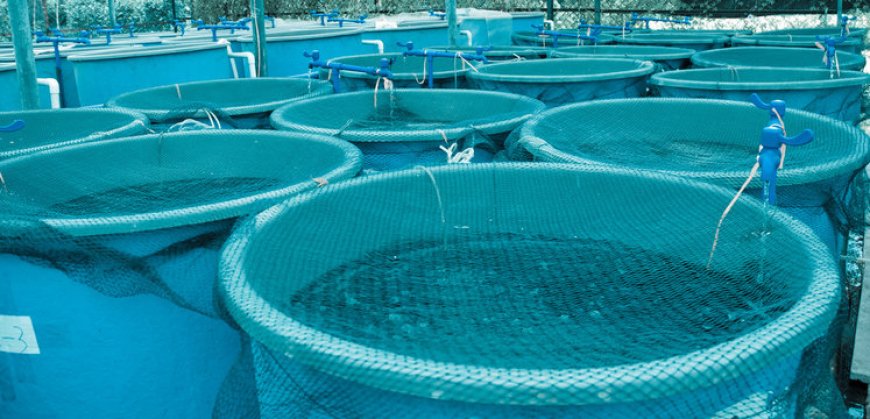Leading Aquaculture Companies in the Middle East: A Growing Industry of Sustainable Seafood Production
quaculture is pivotal in addressing the region's seafood consumption needs. The Middle East has limited natural fishing resources due to overfishing, climate change, and declining fish stocks in the wild. Aquaculture helps meet the demand for fish and seafood products by providing a controlled environment where fish can be farmed sustainably.

Introduction to Aquaculture in the Middle East
Aquaculture, the farming of fish and other aquatic organisms, has become an increasingly important industry in the Middle East. With the region’s growing demand for seafood, limited natural fish resources, and environmental sustainability goals, aquaculture offers an essential solution. The Middle East is home to a range of aquaculture companies focused on sustainable practices and producing high-quality seafood. These companies not only meet local market demands but also contribute to global seafood trade.
Importance of Aquaculture in the Middle East
Aquaculture is pivotal in addressing the region's seafood consumption needs. The Middle East has limited natural fishing resources due to overfishing, climate change, and declining fish stocks in the wild. Aquaculture helps meet the demand for fish and seafood products by providing a controlled environment where fish can be farmed sustainably.
In addition to meeting local demand, aquaculture in the Middle East supports food security, job creation, and economic growth. The Middle East’s strategic location also facilitates the export of farmed seafood to global markets. As a result, the aquaculture industry is poised for growth, with companies in the region adopting modern farming techniques and advanced technologies to ensure the sustainability of their operations.
Key Trends in Aquaculture in the Middle East
-
Sustainable Farming Practices: The need for sustainable food production is a driving force in Middle Eastern aquaculture. Companies are increasingly adopting environmentally friendly practices such as water recycling, eco-friendly feed, and reducing their carbon footprint.
-
Diversification of Aquatic Species: Aquaculture companies in the Middle East are diversifying the species they farm. Traditionally focused on fish such as tilapia and sea bream, many companies are now farming other species, including shrimp, oysters, and even seaweed, to meet changing market demands.
-
Technology and Innovation: Advancements in aquaculture technology are a key trend in the region. Companies are leveraging technology such as automated feeding systems, water quality monitoring, and sustainable aquaculture practices to increase efficiency and ensure optimal growing conditions for farmed seafood.
-
Government Support: Governments in the Middle East are increasingly recognizing the importance of aquaculture to food security and economic growth. In response, they are providing incentives, subsidies, and support to aquaculture companies, encouraging further investment and growth in the industry.
The Role of Aquaculture Companies in the Middle East
Aquaculture companies in the Middle East have adopted various approaches to maintain sustainable operations and produce high-quality seafood. These companies are focused on responsible farming practices, such as ensuring water quality, reducing the use of antibiotics, and implementing effective waste management systems.
They also work closely with local governments to ensure compliance with environmental regulations and contribute to the overall growth of the aquaculture industry in the region. By engaging in research and development, these companies constantly seek innovative ways to improve farming efficiency, reduce environmental impacts, and increase product quality.
Challenges Faced by Aquaculture Companies in the Middle East
While the aquaculture industry in the Middle East is experiencing growth, it is not without challenges. Some of the key obstacles faced by aquaculture companies in the region include:
-
Water Scarcity: The Middle East is one of the driest regions in the world, and water scarcity can be a significant challenge for aquaculture operations. Companies must invest in water-efficient technologies and systems, such as desalination and water recycling, to mitigate this issue.
-
Climate Change and Temperature Fluctuations: Rising ocean temperatures and unpredictable weather patterns can affect the health of farmed fish and other aquatic species. Aquaculture companies need to adapt their farming practices to ensure the survival and growth of their fish in changing environmental conditions.
-
Regulatory Compliance: As the aquaculture industry grows, so does the need for effective regulation. Companies must navigate complex local, regional, and international regulations related to environmental standards, food safety, and production processes to remain compliant.
-
Market Competition: As more companies enter the aquaculture market, competition for consumers and resources becomes more intense. To succeed, aquaculture companies must focus on product quality, sustainability, and innovation to differentiate themselves in the market.
The Future of Aquaculture in the Middle East
The future of aquaculture in the Middle East looks promising, with growing demand for seafood and an increasing focus on sustainable production practices. As the region continues to invest in aquaculture technologies and sustainable practices, companies are expected to achieve higher production efficiency and meet the rising demand for high-quality seafood.
Moreover, governments in the Middle East are placing more emphasis on the role of aquaculture in food security and economic diversification, providing the necessary support and infrastructure to ensure the sector’s success. As the aquaculture industry evolves, there is also potential for increased regional and international trade, helping to position the Middle East as a key player in the global seafood market.
Conclusion
Aquaculture in the Middle East is an industry with significant growth potential. With a focus on sustainability, technological innovation, and diversification, aquaculture companies in the region are poised to play a pivotal role in meeting the increasing demand for seafood. While challenges such as water scarcity, climate change, and market competition remain, the future of aquaculture in the Middle East is bright, with companies adopting cutting-edge practices to ensure the long-term success and sustainability of the industry.
What's Your Reaction?



















![Safe Abortion pills[[+971521786258]] Doha Qatar/Ar Rayyan Qatar/Umm Salal Mu?ammad Qatar/Al Wakrah](https://news.bangboxonline.com/uploads/images/202501/image_430x256_679bc869b24fb.jpg)


